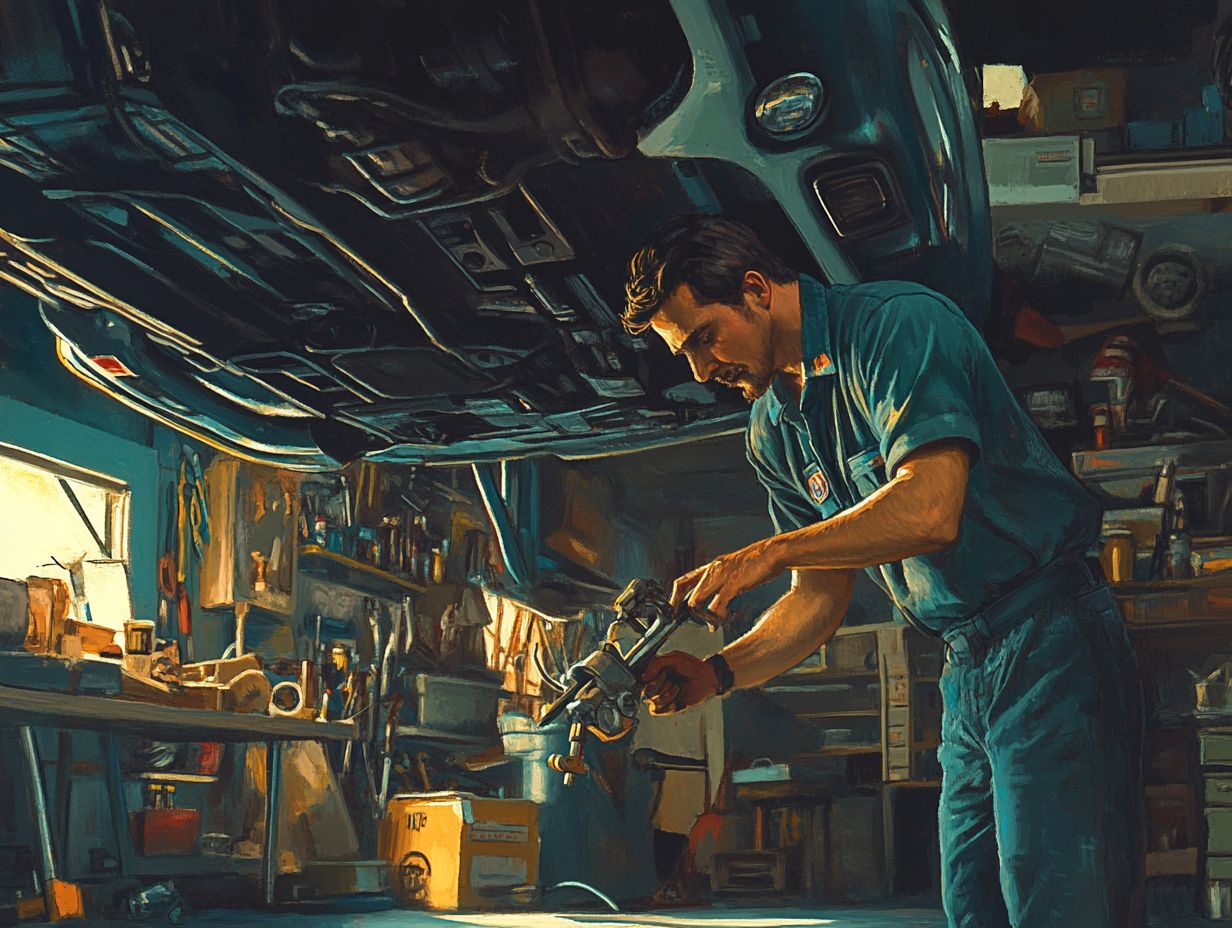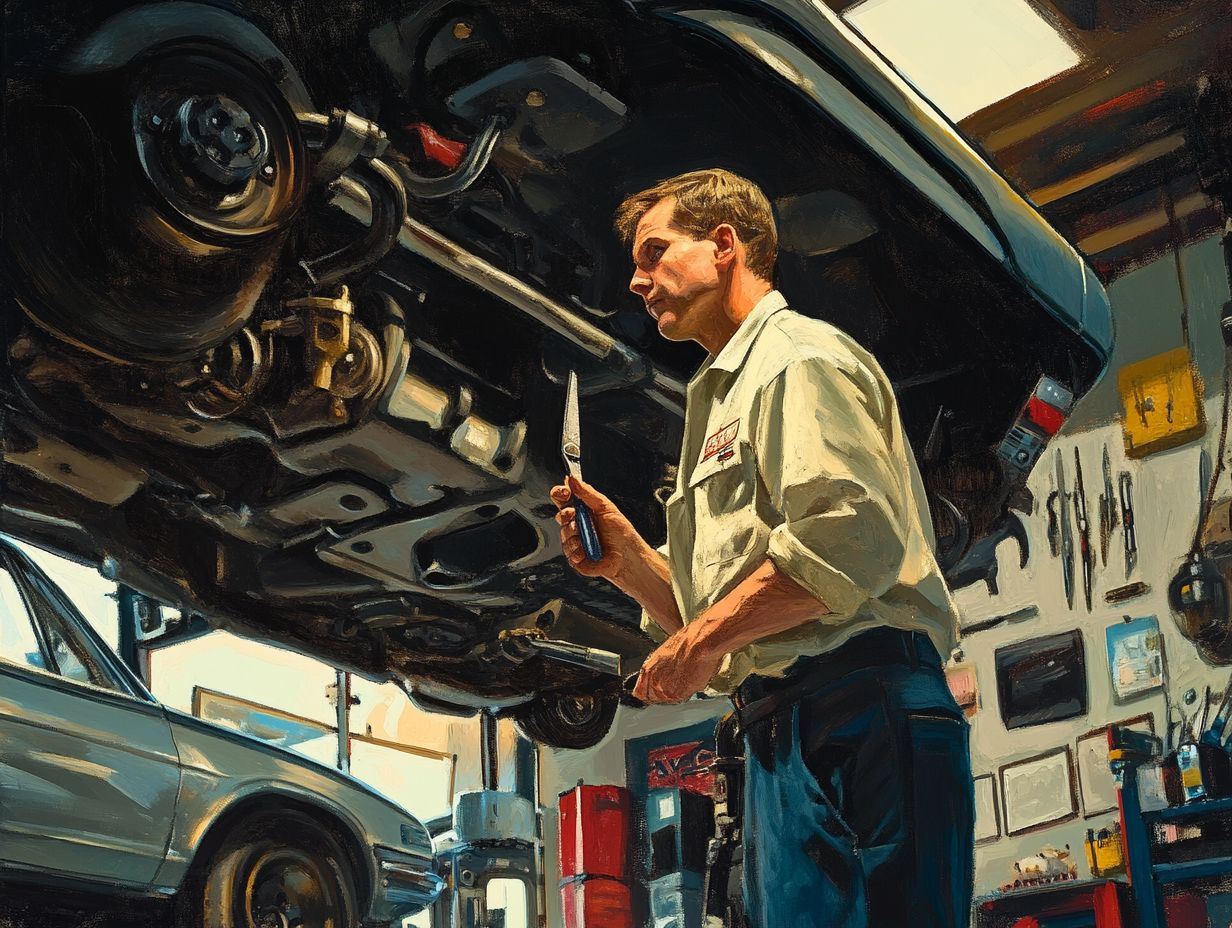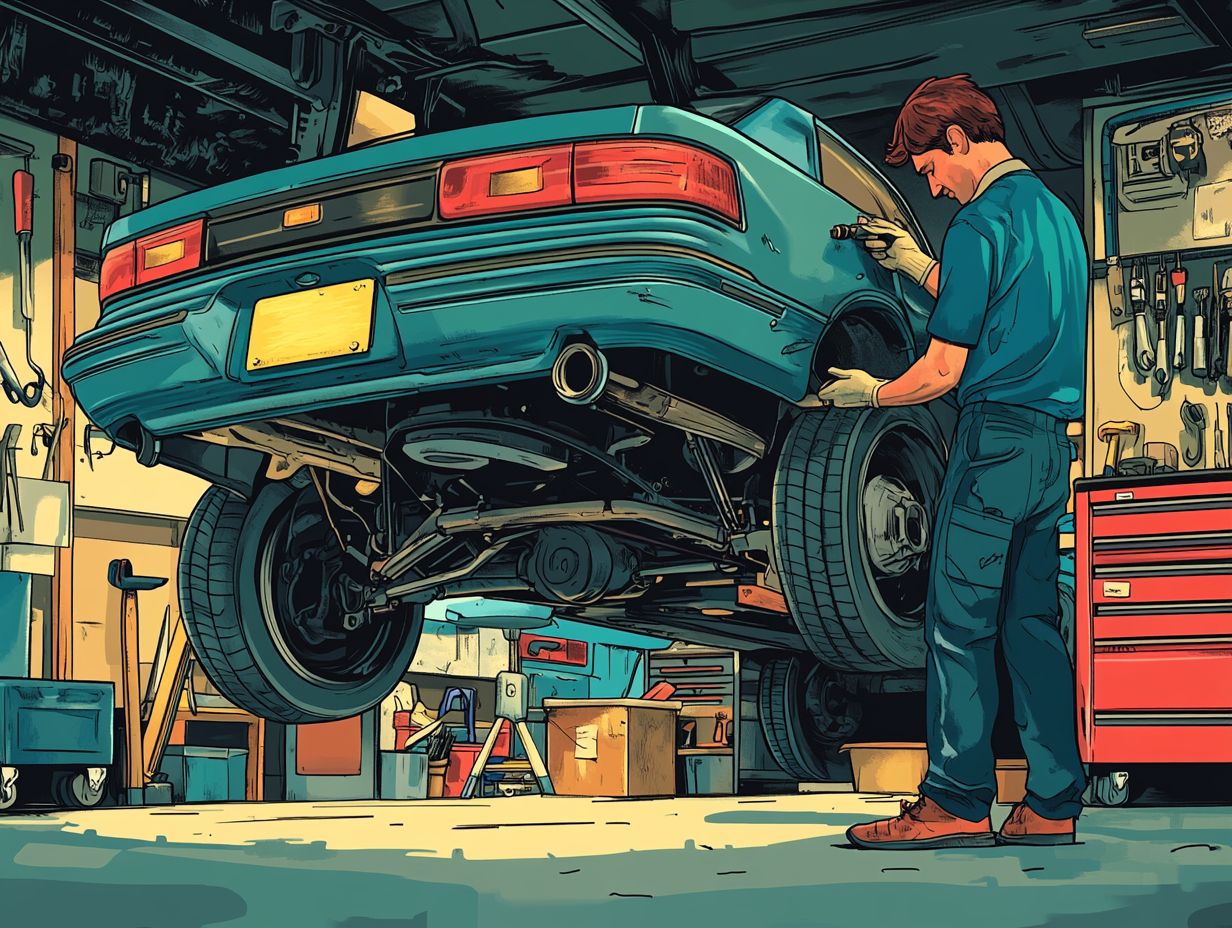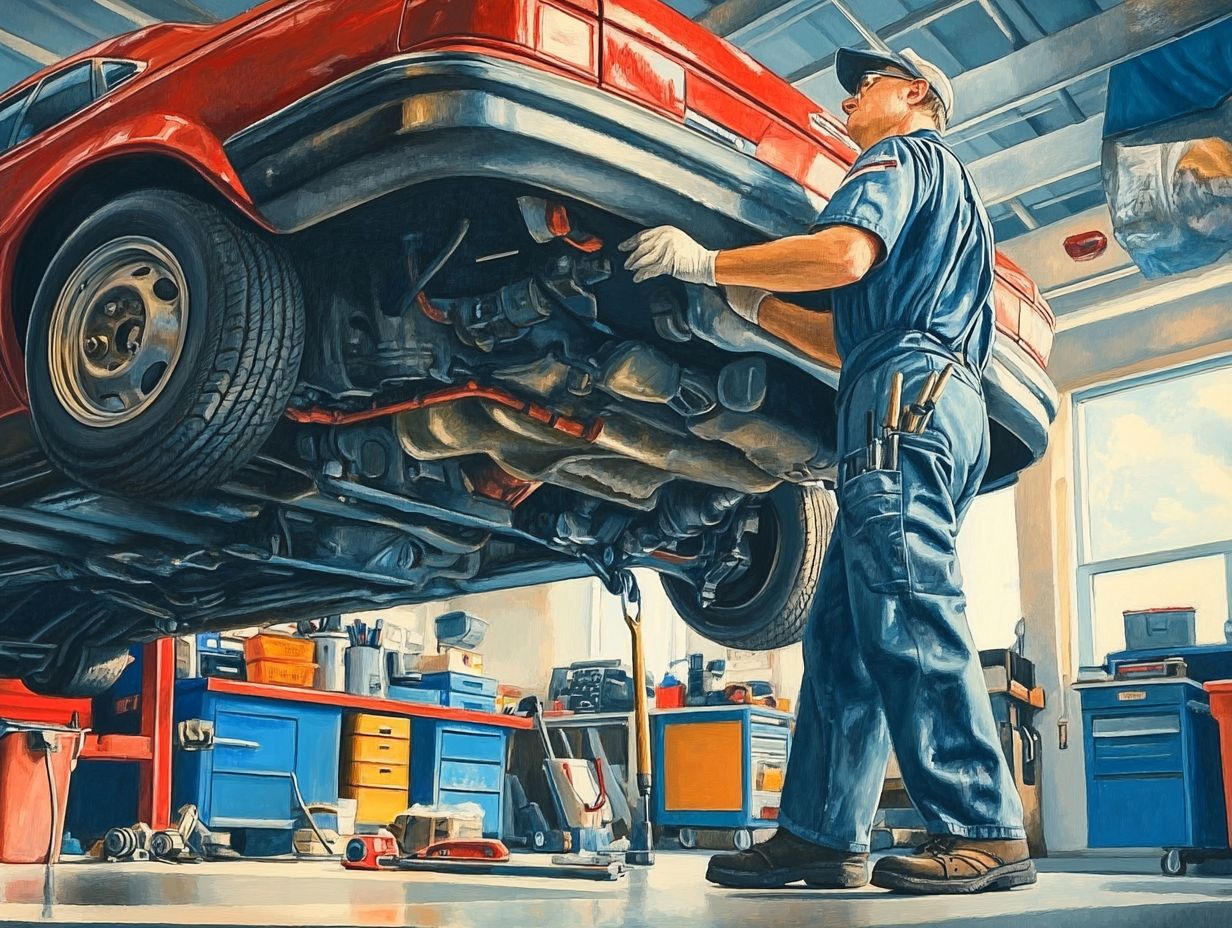Understanding the Most Common Vehicle Repairs
Maintaining your vehicle is essential for ensuring safety, performance, and longevity. This article delves into the most common repairs you may encounter, beginning with engine issues that can spiral into costly problems if left unattended.
Next, we ll explore brake and suspension repairs critical components for your safety on the road. We also address electrical system fixes, transmission troubles, and drivetrain concerns, all of which deserve your attention.
We will share useful tips on preventive maintenance, empowering you to avoid unexpected repairs. Continue reading to keep your vehicle running smoothly and efficiently!
Contents
- Key Takeaways:
- Common Repairs for Engine Issues
- Repairs for Brakes and Suspension
- Electrical System Repairs
- Transmission and Drivetrain Repairs
- Preventive Maintenance for Avoiding Repairs
- Frequently Asked Questions
- What are the most common vehicle repairs and how can I prevent them?
- How can I determine if my vehicle needs a repair?
- Is it safe to continue driving my vehicle if I suspect a repair is needed?
- How often should I have my vehicle inspected for potential repairs?
- Are there any DIY methods for common vehicle repairs?
- How can I find a reliable mechanic for my vehicle repairs?
Key Takeaways:

- Regular maintenance and prompt repairs are essential for the longevity and safety of your vehicle.
- Engine, brake and suspension, electrical system, and transmission and drivetrain issues are among the most common repairs for vehicles.
- Proper preventive maintenance, such as regular oil changes and tire rotations, can help avoid costly repairs in the future.
Why Are Vehicle Repairs Necessary?
Vehicle repairs are essential for your safety, reliability, and optimal performance, making them a vital part of your automotive care routine.
Neglecting maintenance can lead to serious consequences, including reduced safety and unexpected costs. For instance, if you fail to replace worn brake pads, you risk compromising your stopping power, which can endanger both you and others on the road.
The Car Care Council plays a crucial role in educating you about these issues, empowering you with the knowledge of why regular check-ups and timely repairs matter.
Simple tasks like oil changes or tire rotations not only enhance fuel efficiency but also extend the lifespan of your vehicle, ultimately saving you money over time.
By prioritizing these critical repairs, you ensure the safety of both yourself and your passengers.
Common Repairs for Engine Issues
In terms of common engine repairs, you should prioritize essential tasks like oil changes, spark plug replacements, and fuel injector checks. Each of these elements is crucial for maintaining your engine’s performance and efficiency.
Address repairs promptly to prevent serious problems. This helps your vehicle run smoothly and saves you money.
Identifying and Addressing Engine Problems
Identifying and addressing engine problems is crucial for ensuring your vehicle’s performance and longevity. You might notice common signs of engine trouble, such as the ‘check engine’ light coming on, a dip in fuel efficiency, or strange noises.
Don t ignore the check engine light! Addressing it right away can prevent major issues and save you money.
These could point to issues with components like spark plugs or even the fuel cap. Conducting regular diagnostics means checking your vehicle s systems to ensure everything is working correctly.
One effective way to pinpoint engine issues is through comprehensive diagnostics, which assesses critical components like the emissions system and ignition parts. Technicians often use advanced diagnostic tools to read error codes that highlight malfunctions, enabling targeted repairs.
Routine maintenance is essential; regularly checking your spark plugs can help ensure optimal ignition and prevent misfires that could disrupt engine efficiency.
Keeping an eye on the emissions system allows you to catch potential leaks or blockages early, helping you avoid more serious complications down the line.
Taking proactive steps, such as scheduling regular inspections, can greatly extend your engine’s life and enhance its performance, ultimately saving you both time and money.
Repairs for Brakes and Suspension

Repairs for brakes and suspension are essential not only for your vehicle’s safety but also for enhancing your overall driving efficiency and comfort.
By routinely checking the brake pads and suspension components, you can avert serious accidents and minimize the likelihood of expensive repairs, ensuring that your vehicle remains in peak condition.
Taking care of your brakes and suspension not only keeps you safe but also makes every drive enjoyable. Prioritize these checks to experience true peace of mind on the road!
Ready to keep your vehicle in top shape? Schedule your maintenance check today!
Signs of Brake and Suspension Issues
Recognizing the signs of brake and suspension issues is crucial. These components play a vital role in both vehicle safety and performance. If you notice symptoms such as:
- Squeaking brakes
- Vibrations during braking
- Uncomfortably bumpy ride
It’s likely that underlying problems need your immediate attention to ensure safe driving.
You might also notice:
- Your vehicle pulling to one side when braking
- Irregular tire wear
- A noticeable drop in ride comfort such as excessive bouncing or swaying during turns
These issues often arise from worn brake pads, damaged rotors, or compromised suspension parts like struts and bushings. Regular inspections and maintenance are your best defense against these problems. For example, routinely checking brake fluid levels and tire pressure can significantly enhance your vehicle’s performance.
If you’re familiar with automotive basics, consider tackling tasks like changing brake pads yourself. Recognizing these symptoms is essential, as is understanding simple DIY remedies that can keep your vehicle running smoothly.
Electrical System Repairs
Electrical system repairs are increasingly important as today’s vehicles depend on advanced electrical parts for functionality and safety. Problems with the battery, ignition system, or other electrical elements can lead to notable performance issues.
Regular maintenance and prompt repairs are essential for ensuring your vehicle operates smoothly and reliably.
Common Electrical Problems and Solutions
Common electrical problems in your vehicle often arise from issues with the battery or ignition system, significantly affecting safety and reliability. If you’re facing:
- Dead battery
- Faulty wiring
- Malfunctioning electrical components
Addressing these problems immediately is crucial to avoid larger, more costly repairs. You might notice these issues in various forms, such as:
- Flickering lights
- Difficulty starting the engine
- Unresponsive dashboard indicators
Regularly check and maintain your battery connections, ensuring that terminals are clean and free of corrosion. If warning lights continue to flash, troubleshoot other components like fuses or the alternator output to uncover deeper issues.
While you may tackle minor repairs at home, recognizing when to seek professional help is vital. Expert technicians can provide a comprehensive diagnosis, preventing further complications from do-it-yourself attempts.
Transmission and Drivetrain Repairs

Transmission and drivetrain repairs are crucial for preserving your vehicle’s performance and avoiding serious complications from neglect. By prioritizing regular inspections and addressing issues promptly, you can tackle common concerns like:
- Slipping gears
- Strange noises
This proactive approach ensures that your vehicle continues to operate smoothly and efficiently, safeguarding your investment and enhancing your driving experience.
Don’t miss out on keeping your vehicle in top shape schedule a maintenance check today!
Diagnosing and Fixing Transmission and Drivetrain Issues
Diagnosing and fixing transmission and drivetrain issues is crucial for ensuring your vehicle’s safety and performance. These systems are fundamental to your car’s ability to function effectively. If you notice symptoms like transmission slipping or delayed shifting, seek prompt diagnosis to prevent further damage and avoid costly repairs.
To accurately identify these problems, mechanics often use visual inspections, diagnostic tools that help find vehicle problems, and road tests. Signs such as unusual noises, fluid leaks, or warning lights can indicate a failing transmission or drivetrain issue that shouldn’t be ignored.
Recommended repairs can vary widely, ranging from minor adjustments to major overhauls based on the specific diagnosis. Regular maintenance, including fluid changes and thorough inspections, plays a vital role in preventing these issues before they escalate.
A good automotive warranty gives you peace of mind and financial protection against unexpected repair costs, underscoring the importance of safeguarding your vehicle s health.
Preventive Maintenance for Avoiding Repairs
Engaging in preventive maintenance is a smart move that can lower your repair costs while extending the life of your vehicle.
By establishing a consistent maintenance schedule that includes oil changes, fluid checks, and timely part replacements, you can keep your vehicle in peak condition and avoid unforeseen breakdowns.
Tips for Keeping Your Vehicle in Good Condition
Maintaining your vehicle requires a combination of routine checks, timely repairs, and understanding how your driving habits influence performance. Simple practices, like regularly checking your oil levels and ensuring your tire pressure is optimal, can enhance driving efficiency and extend your vehicle’s lifespan especially if you drive a lot.
Incorporating regular inspections of the brake system and replacing air filters can lead to optimal engine performance. If you enjoy a hands-on approach, tackling DIY tasks such as changing wiper blades or checking fluid levels can be fulfilling and economical.
Pay attention to your driving habits like aggressive acceleration or frequent idling as they can strain the engine and reduce fuel efficiency. By being mindful of these practices, you can adopt proactive maintenance strategies that ensure a smoother, safer ride.
Frequently Asked Questions
What are the most common vehicle repairs and how can I prevent them?
The most common vehicle repairs include oil changes, brake replacements, tire rotations, and battery replacements. To prevent these, it’s important to follow your vehicle’s recommended maintenance schedule and be aware of what are the most common car repairs to address any issues as soon as they arise.
How can I determine if my vehicle needs a repair?
Pay attention to any unusual noises or vibrations, warning lights on the dashboard, or changes in performance. If you notice any of these signs, it’s best to have your vehicle inspected by a professional mechanic.
Is it safe to continue driving my vehicle if I suspect a repair is needed?
It is not recommended to continue driving your vehicle if you suspect a repair is needed. Ignoring potential issues can lead to further damage and unsafe driving conditions.
How often should I have my vehicle inspected for potential repairs?
It’s recommended to have your vehicle inspected annually or every 12,000 miles, whichever comes first. Regular inspections can help catch potential issues early on and prevent more costly repairs down the road.
Are there any DIY methods for common vehicle repairs?
While some minor repairs can be done by yourself, remember that vehicles are complex machines. It’s best to leave major repairs to trained professionals. Attempting to fix an issue without the proper knowledge and tools can result in further damage.
Consider scheduling an inspection or maintenance check today to ensure your vehicle runs smoothly!
How can I find a reliable mechanic for my vehicle repairs?
Start by researching local mechanics and reading customer reviews. You want the best care for your car!
Ask for recommendations from friends and family.
Find a mechanic who knows your car brand well.







